Coronavirus lockdown: GST collections may see a sharp drop in March and April
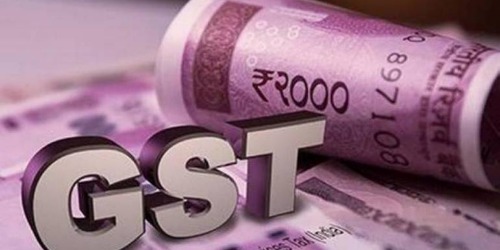
Virtual lockdown and closure of offices across states will have impact on GST collections in March and April even as taxpayers demand extension of date of filing of returns from March 20 to some other date.
Businesses across the board would operate at minimal level. Primarily, sectors such as travel, hotel and food will see a sharp fall in the business.
According to an SBI research report, the inoperability analysis for three sectors namely Transport, Tourism and Hotels shows significant impact on demand and hence output. "On an aggregate basis, we estimate that the impact of a 5 per cent inoperability shock could be 90 basis point on GDP from Trade, Hotel and Transport to Storage and Communication segment. It could be spread over 2019-20 and 2020-21, with a larger impact in the latter year."
The report further says on an average 25 million and 300 million people use airplanes and trains, respectively each month. "A 10 per cent reduction will lead to loss of revenue of Rs 3,500 crore on a monthly basis."
Trade, hotels, transport, communication and broadcasting were likely to generate Rs 33 lakh crore worth of value of services in the current financial year. This number might be revised downward, impacting GST collections from this segment.
GST is charged at 5 per cent on economy class airfare and 12 per cent on business class airfare, while GST on train fare is 5 per cent. The GST on hotel rooms with tariffs of up to Rs 7,500 per night is 12 per cent and the tax on room tariff of above Rs 7,500 is 18 per cent. Impact on transport, tourism and hotels would further impact sectors such as fuel minerals, electricity and water and rubber, plastic, coke and petroleum products.
All these would impact the GST collections immediately further squeezing the government's fiscal situation in the current financial year though finance ministry officials expects the impact of corona virus to be visible only in the next financial year. The government had a GST collection target of Rs 1.25 lakh crore in March. That looks unlikely now. In February, the monthly GST collection was Rs 1.06 lakh crore against the revenue department's target of Rs 1.10 lakh crore.
As per the central government's revised budget estimate, revenue from GST in the current financial year is likely to be Rs 6.12 lakh crore. Till January, the collection was around Rs 5 lakh crore.
Meanwhile, with most offices have been forced to work on minimal staff and many have asked their employees to work from home, many businesses would find it difficult to file returns on the due date - 20th March. There is now demand from some quarters that GST filing dates should be deferred.
"As the taxpayers short of staff as most of them are unable to report to offices, an extension of due date of payment of GST and filing of return is eagerly being awaited," says Pritam Mahure, a Pune-based chartered accountant.
Rajat Mohan, partner, AMRG & Associates, says though they are not facing any problem technologically, flow of data is a big issue. "There are no discussions around issues with the data that we have of our clients as they are shutting down offices. We are just pushing across the same to the servers and getting it filed," he says.
- 0
- Leave a comment
Coronavirus effect: Moody's slashes India's GDP growth to 5.3% for 2020
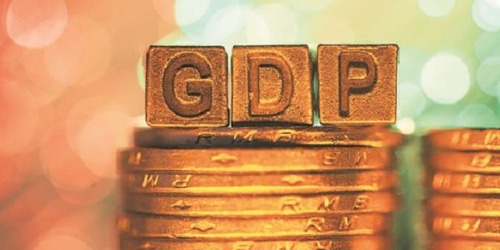
Global rating agency Moody's Investors Service on Tuesday slashed India's GDP growth estimate for 2020 calendar year to 5.3 per cent on coronavirus implications, ongoing travel restrictions and heightened containment measures. The agency has projected a 5.8 per cent gross domestic product (GDP) growth for 2021.
In February, Moody's had lowered India's GDP growth to 5.4 per cent for 2020 from 6.6 per cent forecasted earlier, citing coronavirus implications on the economy.
India's GDP growth improved marginally to 4.7 per cent during the third quarter of 2019-20, from a 6-year low of 4.5 per cent during the July-September quarter. The National Statistical Office (NSO) has pegged India's economic growth for the current fiscal at 5 per cent - the lowest in 11 years - but it expects a recovery in FY21 when the economy is forecasted to grow at 6-6.5 per cent.
According to Moody's, there would be significant economic fallout from a more rapid and wider spread of the coronavirus. It said dampening of domestic consumption demand in affected countries exacerbate disruptions to supply chains and cross-border trade of goods and services.
"The longer the disruptions last, the greater the risk of global recession becomes," it said.
"A number of governments and central banks have announced countervailing measures, including fiscal stimulus packages, policy rate cuts, and regulatory forbearance; however, the effectiveness of policy easing will be blunted by measures to contain the outbreak, and policy space is constrained for some sovereigns," the agency added.
Moody's has also revised its forecasts for most Asia-Pacific (APAC) economies on coronavirus impact as well as the recent oil price shocks.
"Our baseline scenario assumes declining consumption levels and continuing disruptions to production and supply chains in the first half of 2020, followed by a recovery in the the second half of the year," says Christian de Guzman, a Moody's Senior Vice President.
"In the short run, this is playing out as both negative supply and demand shocks, and the longer the disruptions last, the greater the risk of a global recession," adds Guzman.
Rising infection rates would further impede global sentiment, heightening asset price volatility and tightening financing conditions, which could snowball into a deeper economic contraction.
A number of governments have already announced measures to cope with the impact of the coronavirus, and Moody's expects there will be more fiscal stimulus as the extent of the economic fallout becomes clearer. However, some governments - mainly frontier markets - may be constrained by their high indebtedness and limited access to funding, it added.
RBI Governor says India not immune, coronavirus may slow down growth
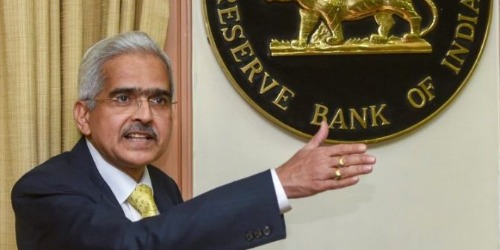
Reserve Bank of India Governor Shaktikanta Das said that India is not immune to the deadly virus and trade channels could be affected as exposure to China is relatively high. He also added that growth momentum of the country could be impacted by COVID-19.
"India is not immune to this pandemic. Already more than 100 cases have been reported. Efforts are being mounted by the government on war-footing. COVID-19 could impact India directly through trade channels, in which exposure to China is relatively high," he said.
Governor Das said, "Second round of effects of the pandemic could operate through a slowdown in the domestic economic growth and it would obviously be a result of synchronised slowdown in global growth. As a part of that, the growth momentum in India would also be impacted somewhat."
Shaktikanta Das' comments on the pandemic come as manufacturers in the country are feeling the heat of the disturbance in the supply chain. The Parliament was informed on Wednesday by Commerce Minister Piyush Goyal that due to the shutdown of factories in China, industries such as pharma, electronics and automobile that import components and raw materials could be affected.
In a separate press conference, Finance Minister Nirmala Sitharaman also said that the government and state governments are continuously monitoring and making sure that timely and effective steps are taken. "Each department is working best on ways to provide relief," said the minister.
The RBI Governor also spoke about the troubled Yes Bank at the press conference on Monday. "Swift action has been taken by the RBI and government of India. The lifting of moratorium will be on Wednesday, 18th March at 6pm. The new board will assume its position and the office of the administration will cease to exist on March 26," he said.
FM Nirmala Sitharaman to meet heads of merging banks on Thursday
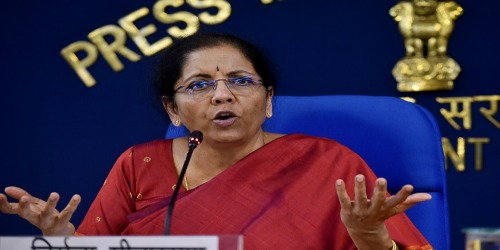
Finance Minister Nirmala Sitharaman will hold meeting with chief executives of amalgamating banks on Thursday to review preparedness for the merger beginning April 1.
Earlier this month, the Union Cabinet headed by Prime Minister Narendra Modi approved consolidation of 10 state-owned banks into four. According to sources, the finance minister will review planning and preparedness of merging banks on March 12.
Agenda of the high-profile meeting includes readiness of anchor banks to minimise disruption to customers and ensuring credit flow to productive sectors of the economy, sources said. The meeting will also review preparedness of delivery of banking services and products to customers after the mergers.
It will also discuss business and financial plans, including credit and deposits growth, and year-wise synergy realisation after the mergers. The mergers are scheduled to come into effect from April 1.
As per the proposal, Oriental Bank of Commerce (OBC) and United Bank of India (UBI) would be merged into Punjab National Bank (PNB). The move will make PNB India's second-biggest public sector bank after State Bank of India (SBI).
Syndicate Bank will be merged with Canara Bank, creating India's fourth-largest public sector bank.
Union Bank of India, Andhra Bank and Corporation Bank will be merged together to create fifth-largest public sector bank. Indian Bank and Allahabad Bank will be merged to form India's seventh-largest public sector bank.
The mega consolidation would help create banks with scale comparable to global banks and capable of competing effectively in India and globally. Last year, Dena Bank and Vijaya Bank were merged with Bank of Baroda. Prior to this, the government had merged five associate banks of SBI and Bharatiya Mahila Bank with SBI.
Citing an example of the merger of Dena Bank and Vijaya Bank with Bank of Baroda, Sitharaman after the Cabinet meeting had said the operating profit of the resulting lender has improved and retail loans are now sanctioned in 11 days on an average as compared to 23 days earlier.
Reliance Industries Suffers Biggest Single-Day Loss In At Least 10 Years
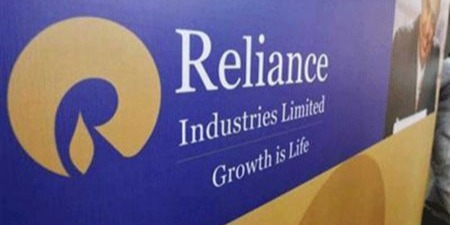
Shares of companies engaged in crude oil exploration business fell sharply after crude oil prices crashed in international markets. The operator of world's largest crude oil refining facility at Jamnagar and operator of KG-D6 basin in Krishna Godavari basin - Reliance Industries - slumped as much as 13.65 per cent, its biggest single-day fall in at least 10 years, to hit an intra-day low of 1,096.65, data from BSE showed. State-run oil explorer ONGC also slumped as much as 13 per cent to hit an intra-day low of Rs 77.80. Oil prices in international markets crashed more than 30 per cent after the disintegration of the Organization of the Petroleum Exporting Countries (OPEC)+ alliance triggered an all-out price war between Saudi Arabia and Russia that is likely to have sweeping political and economic consequences.
Crude oil fell the most since 1991 on Monday after Saudi Arabia started a price war with Russia by slashing its selling price and pledging to unleash its pent-up supply onto a market reeling from falling demand because of the coronavirus outbreak.
Brent crude futures fell by as much as $14.25, or 31.5 per cent, to $31.02 a barrel. That was the biggest percentage drop since January 17, 1991, the start of first Gulf War, and the lowest since February 12, 2016.
US West Texas Intermediate (WTI) crude fell as much as $11.28, or 27.4 per cent, to $30 a barrel. That was also the biggest percentage drop since the first Gulf War in January 1991 and the lowest since February 22, 2016. It was trading at $32.61.
Meanwhile, equity markets witnessed heavy selling pressure on Monday as benchmark indices slumped more than 4 per cent tracking a selloff in global markets, as investors panicked about the severity of coronavirus pandemic amid fears of recession.
Reliance Industries ended 13 per cent lower at Rs 1,104.50 and ONGC dropped 16 per cent to close at Rs 74.35, under-performing the Sensex which ended 5.2 per cent lower.


